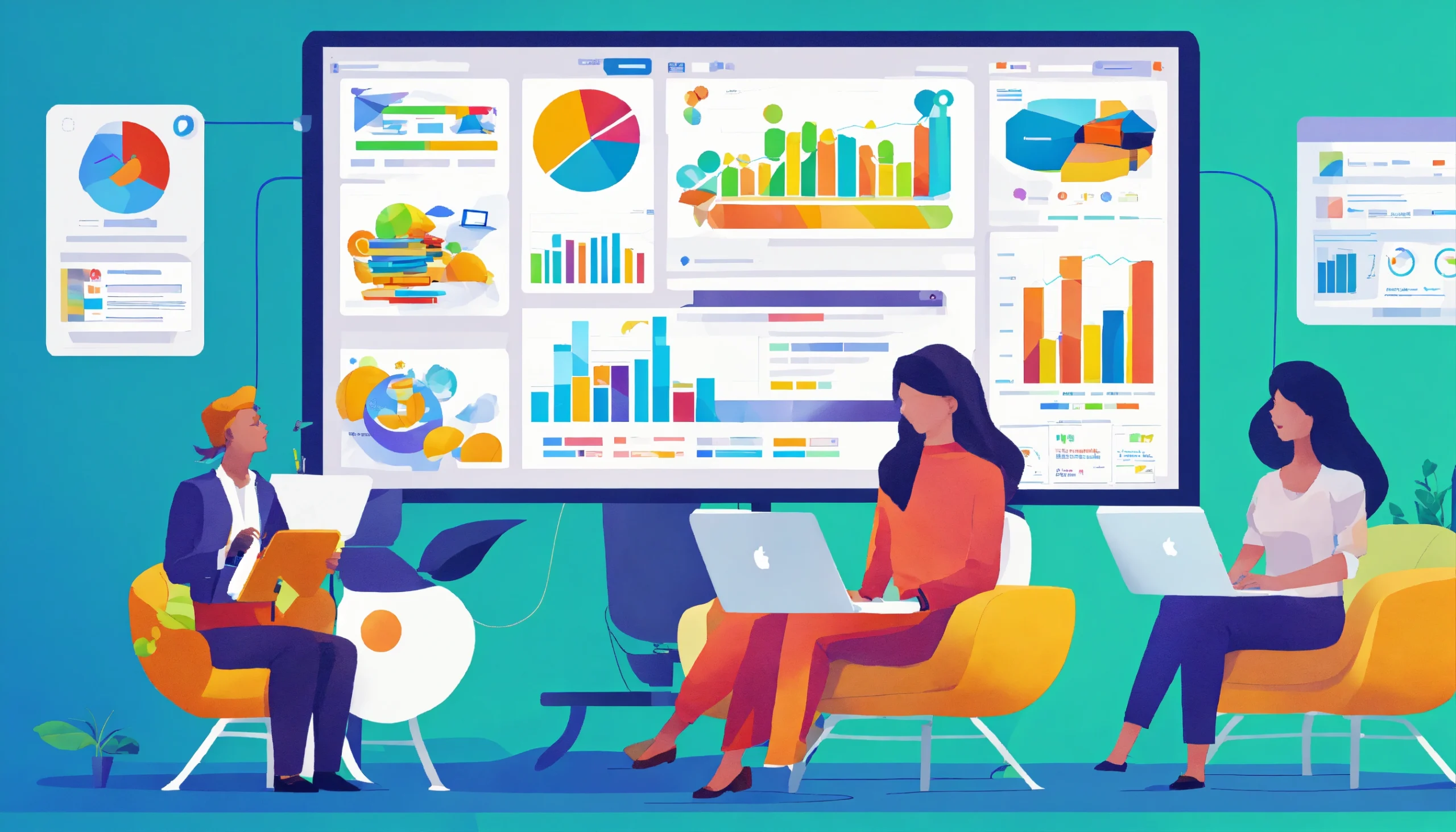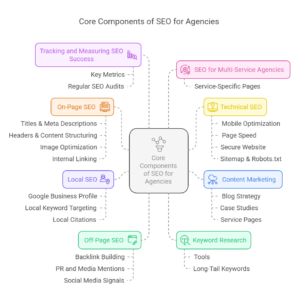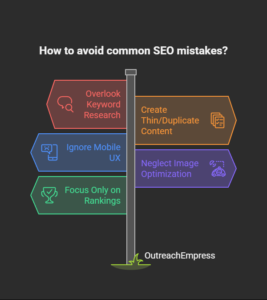
As we all know, in today’s competitive era, making your website stand out has become very important for agencies to attract businesses mainly looking for designing, marketing, or development services. Search engine optimization is one of the most effective ways of attracting potential customers and increasing agency visibility. This article includes an in-depth overview of SEO for agencies, hence ensuring that you get a comprehensive knowledge of all the tools that would help you get higher rankings and attract organic traffic to your website.
What is SEO, and Why Does It Matter for Agencies?
SEO (Search Engine Optimization) refers to the process of enhancing a website’s visibility in search engine results pages (SERPs). When potential clients search for services like “digital marketing agency in New York” or “web development agency for startups,” agencies with strong SEO strategies appear at the top — attracting more traffic, leads, and ultimately, clients.
For agencies, SEO serves as both a lead generation tool and a credibility builder. A well-optimized website signals authority, expertise, and trustworthiness — essential for agencies that provide marketing or digital services themselves.
Core Benefits of SEO for Agencies
-
Increased Organic Visibility
Higher rankings mean your agency appears to more potential clients actively searching for your services. This visibility leads to consistent traffic without ongoing ad spend.
-
Enhanced Credibility and Authority
Agencies that rank high are seen as credible industry leaders. If you claim to offer SEO, PPC, or digital marketing services, ranking on page one validates your expertise.
-
Competitive Advantage
SEO helps level the playing field. Even smaller agencies can compete with larger firms if their SEO game is strong.
-
Long-Term ROI
SEO delivers long-term returns, unlike paid ads that stop generating traffic once your budget runs out. A well-optimized page can attract traffic for years.
Core Components of SEO for Agencies

-
Keyword Research for Agencies
Keyword research is the foundation of SEO. Agencies need to target keywords that potential clients search for. Examples include:
- “SEO agency in [City]”
- “Performance marketing agency”
- “Social media marketing for eCommerce”
- “Creative agency for startups”
Tools for Keyword Research
- Google Keyword Planner
- SEMrush
- Ahrefs
- Ubersuggest
- Long-Tail Keywords
Don’t just focus on short terms like “SEO agency.” Target long-tail keywords like “affordable SEO agency for small businesses” to capture intent-driven traffic.
-
On-Page SEO Best Practices
Optimizing Titles & Meta Descriptions:
Each page should have a unique, keyword-rich title and meta description that encourages clicks. Example:
- Title: Award-Winning SEO Agency in New York | Digital Growth Experts
- Meta Description: Drive more traffic and leads with our tailored SEO solutions. Partner with a top-rated New York SEO agency today.
Headers and Content Structuring:
Use H1, H2, H3 tags to structure content for both users and search engines. Each page should target a primary keyword and related variations.
Image Optimization:
Use descriptive file names and alt text to ensure images contribute to SEO. Example:
- File name: seo-services-agency-new-york.jpg
- Alt text: SEO services offered by a New York-based digital agency
Internal Linking Strategy:
Internal links help distribute page authority and improve website navigation. Link to:
- Service pages
- Case studies
- Blog content
-
Technical SEO for Agencies
Mobile Optimization:
Google’s mobile-first indexing means your site must perform flawlessly on mobile devices. Use responsive design and test pages with Google Mobile-Friendly Test.
Page Speed:
Agencies must ensure fast-loading websites using:
- Compressed images
- Caching
- Minimizing unnecessary scripts
- Using CDNs (Content Delivery Networks)
Secure Website (HTTPS):
Google prioritizes secure sites. Ensure your agency website uses SSL certificates to protect client data and boost rankings.
Sitemap and Robots.txt:
Submit an XML sitemap to Google Search Console and ensure the robots.txt file doesn’t block essential pages.
-
Content Marketing for Agencies
Blog Strategy:
Regularly publishing educational content boosts SEO and positions your agency as an industry authority. Topics can include:
- “SEO Trends 2025”
- “Best Digital Marketing Tools for Agencies”
- “PPC vs SEO: Which Drives Better ROI?”
Case Studies and Portfolio Pages:
Create optimized case study pages showcasing past successes. Use storytelling, client quotes, and quantifiable results to enhance credibility.
Service Pages:
Each service — SEO, PPC, Social Media — should have a dedicated page optimized for relevant keywords.
-
Local SEO for Agencies
- For agencies targeting clients in specific cities or regions, local SEO is essential.
- Google Business Profile Optimization
Complete your Google Business Profile with:
- Correct business name, address, and phone number (NAP)
- High-quality images
- Detailed service descriptions
- Client reviews
Local Keyword Targeting
Target geo-specific keywords like “Digital Marketing Agency in Chicago” across:
- Title tags
- Meta descriptions
- Page content
- Local Citations
List your agency on directories like:
- Yelp
- Clutch
- UpCity
- DesignRush
- Off-Page SEO for Agencies
6. Link Building
Earning backlinks from reputable websites boosts authority. Effective link building tactics include:
- Guest posting on marketing blogs
- Partnerships with complementary agencies
- Featuring in industry roundups
PR and Media Mentions
Getting your agency mentioned in top industry publications (like HubSpot or Search Engine Journal) increases visibility and backlinks.
Social Media Signals
While not a direct ranking factor, social shares can amplify content reach and indirectly influence SEO.
-
SEO for Multi-Service Agencies
If your agency offers SEO, PPC, content marketing, and web design, each service needs its own optimized page. Avoid lumping everything into a single “Services” page.
-
Tracking and Measuring SEO Success
Key Metrics
- Organic Traffic: Monitor traffic growth via Google Analytics.
- Keyword Rankings: Track rankings in tools like SEMrush or Ahrefs.
- Backlinks: Use Ahrefs or Moz to monitor backlink growth.
- Lead Generation: Track how many organic visitors turn into leads via contact forms.
Regular SEO Audits
Run comprehensive audits using tools like:
- Screaming Frog
- SEMrush Site Audit
- Google Search Console
Common SEO Mistakes Agencies Should Avoid
Here are some of the common SEO mistakes that businesses end up doing:
-
Overlooking Keyword Research
Targeting irrelevant or low-intent keywords can lead to traffic with no conversion value.
-
Thin or Duplicate Content
Reusing content across service pages or offering shallow content can hurt rankings.
-
Ignoring Mobile UX
A poor mobile experience leads to higher bounce rates and lower rankings.
-
Neglecting Image Optimization
Large images slow down websites and unoptimized alt text misses keyword opportunities.
-
Focusing Only on Rankings
Rankings matter, but conversions and lead quality matter more.

SEO Tools Agencies Should Use
Here are some of the most important tools that agencies can use to improve their overall SEO performance:
|
Tool |
Purpose |
|
Google Search Console |
Performance Tracking |
|
Google Analytics |
Traffic Analysis |
|
Ahref |
Keyword & Backlink Analysis |
|
SEMrush |
Competitor Research |
|
Screaming Frog |
Technical Audits |
Final Thoughts: SEO as a Growth Engine for Agencies
In conclusion, we can say that search engine optimisation is no longer an option for agencies these days. It has evolved to be one of the most important factors that must be considered by agencies. Irrespective of whether you are a full-service, digital age agency or in a specialised SEO firm, having a strong SEO strategy is a must to find potential customers and increase the visibility of your website over the web. By conducting proper keyword research, creating reliable and informative content, and optimising their website technically, agencies can effectively establish their brand name in the market and reduce their dependency on paid ads for higher visibility.

